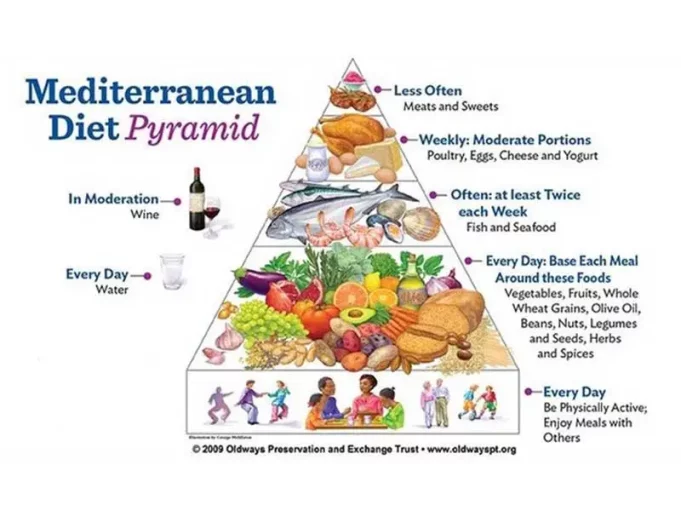New research suggests that the Mediterranean diet, known for keeping hearts healthy, can also be a game-changer for folks dealing with type 2 diabetes. Discover how this approach can help control your blood sugar, shed some pounds, and get started on this tasty journey.
The Mediterranean diet, named after how folks around the Mediterranean Sea eat, has always been in the spotlight for its heart-friendly perks. Now, it turns out it’s a winning ticket for those with type 2 diabetes. You’re looking at better blood sugar, weight loss, and a plate full of flavors.
READ ALSO: Iodine Boost: Unleashing the Power of a Balanced Diet for a Thriving Body!
How the Mediterranean Diet Can Tackle Type 2 Diabetes
In a nutshell, the Mediterranean diet loads you up on what your body loves – veggies, whole grains, and good fats – and cuts down on the stuff it doesn’t, like red meat, sugary treats, and refined carbs. According to Nicole M. Bereolos, a certified diabetes care and education specialist, this diet packs a punch of the good stuff your body craves.
Previous studies compared the Mediterranean diet with various others – vegetarian, vegan, low-carb, high-protein, high-fiber, and low-glycemic-index diets. Surprise, surprise – the Mediterranean diet stole the show.
Participants on this diet, along with low-glycemic index, low-carb, and high-protein plans, saw better blood sugar control, reflected in lower A1C scores. But here’s the kicker – those on the Mediterranean diet not only lost the most weight but also boosted their heart health with improved cholesterol levels.
Betul Hatipoglu, MD, an endocrinologist, breaks it down: “The Mediterranean diet is rich in fruits and vegetables, uses whole grains and lean proteins like fish, and relies on olive oil and nuts for fats. These choices are loaded with monounsaturated fat and fiber, both known to lower cholesterol and blood sugar in people with diabetes.”
8 Awesome Health Perks of the Mediterranean Diet
Aside from helping you drop pounds, this diet is a superstar for heart and brain health. In the world of diabetes, the focus is on dodging complications. Sharon Movsas, a clinical nutritionist, points out that one of the top complications is heart disease, including heart attacks and strokes. As if that wasn’t enough, diabetes often brings along high blood pressure and cholesterol, both heart disease risk factors.
The Mediterranean diet acts like a superhero cape for your heart. It keeps blood pressure and cholesterol levels in check, as proven by a study showing that an olive oil-rich Mediterranean diet worked better than a standard low-fat diet for folks with type 2 diabetes and prediabetes.
This diet jazzes up arterial blood flow, slowing down the artery plaque buildup, aka atherosclerosis. Plus, its anti-inflammatory and antioxidant properties cut your chances of a heart attack by up to 30 percent.
The Mediterranean diet even lets you savor some red wine, low-fat dairy, eggs, and lean meat – all in moderation, of course. Kelly Kennedy, a nutritionist, adds, “It swaps out bad fats for good ones, possibly explaining the positive impact on insulin sensitivity.” Research hints that the high polyphenol content (antioxidant plant compounds) in Mediterranean diet foods may also help fight insulin resistance.
How a Mediterranean-Style Eating Plan Can Prevent Type 2 Diabetes
It’s not just for those with diabetes; even those at risk, like those dealing with metabolic syndrome, can lower their diabetes odds by 23 percent, says a systematic review. In the blood sugar control game, the Mediterranean diet outshines low-fat diets.
Don’t let the word “diet” fool you – it’s not a quick fix. Dr. Bereolos emphasizes that it’s a lifestyle change. In fact, studies show it’s just as effective as other long-term weight loss diets, like low-fat, low-carb, and the American Diabetes Association diet.
Committing to the Change
Switching to a Mediterranean diet isn’t as tricky as it sounds, and you don’t need to relocate to Europe to pull it off. Like any healthy diet, start by choosing fresh fruits and veggies and opting for lean proteins like fish and chicken instead of red meat, says Dr. Hatipoglu.
Stock up your kitchen with the basics. As Kennedy puts it, “The key is minimal processing.” Here’s a shopping list to get you started:
Foods to Eat on the Mediterranean Diet
- Whole grains
- Nuts, seeds, beans, and legumes
- Vegetables
- Fruits
- Healthy fats
- Drinks
- Fresh fish and seafood
- Healthy dairy, eggs, and poultry
- Herbs and spices
Foods to Limit
- Beef, lamb, pork
- Burgers
- Butter
- Sweets
Foods to Avoid
- Processed meats
- Ultra-processed foods
- Fast food
- Soda and other sugary drinks
























